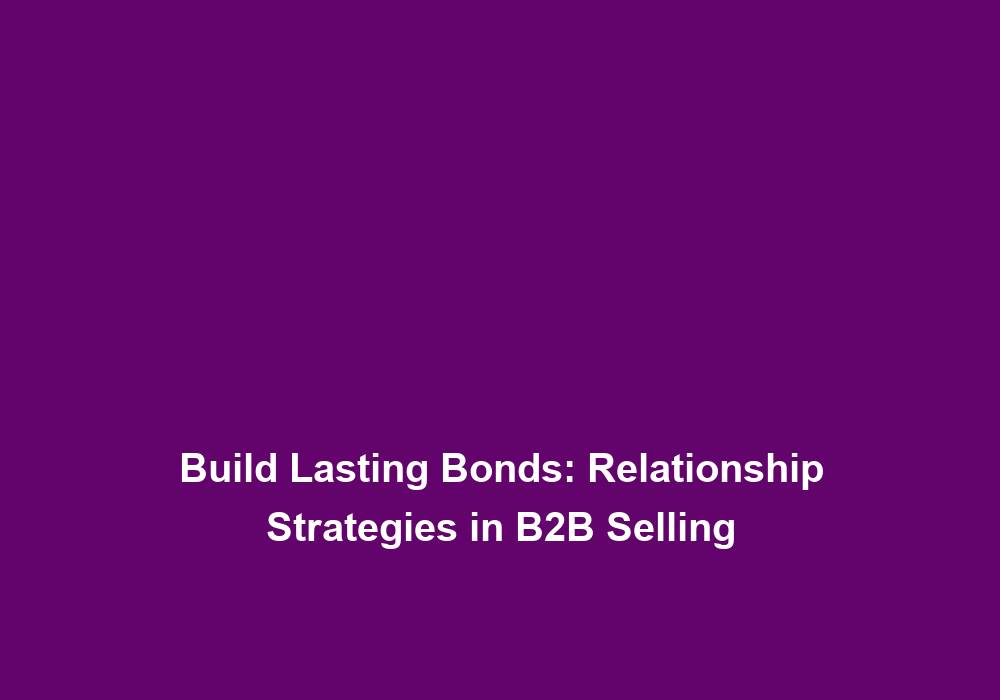In today’s highly competitive business world, establishing and nurturing strong relationships is crucial for success in B2B selling. Building lasting bonds with your clients not only leads to repeat business, but also ensures greater customer loyalty and brand advocacy. In this article, we will explore effective relationship strategies that can help you forge strong connections with your B2B clients.
Understanding the Importance of Relationships in B2B Selling
Relationships play a pivotal role in B2B selling for several reasons. Firstly, B2B transactions usually involve larger deals and longer sales cycles, making it essential to build trust and credibility over an extended period. This requires consistently delivering on your promises and exceeding customer expectations. Secondly, B2B decision-making often involves multiple stakeholders, and having strong relationships with each of them can significantly influence the final buying decision. By understanding the needs and concerns of each stakeholder, you can tailor your approach and address their specific pain points. Lastly, in a marketplace saturated with competitors, maintaining strong relationships with your clients can help differentiate your brand and create a competitive advantage. By fostering a sense of trust and loyalty, you position yourself as a preferred partner in their business journey.
The Power of Personalization
To build strong relationships with your B2B clients, it is important to prioritize personalization. Treat each client as an individual entity with unique needs, goals, and challenges. By understanding their specific pain points and tailoring your solutions accordingly, you demonstrate that you genuinely care about their success. Personalization can involve customizing your communication, offering personalized recommendations, or providing tailored solutions that align with their business objectives. This level of personalization shows your clients that you understand their unique circumstances and are committed to helping them achieve their goals.
Establishing Trust and Credibility
Trust and credibility are the foundation of any successful business relationship. In B2B selling, where high-value transactions are involved, establishing trust becomes even more critical. To build trust, focus on delivering on your promises consistently. Be transparent in your communication, and always follow through on commitments. By demonstrating your reliability and expertise, you can instill confidence in your clients, ensuring they feel comfortable relying on you as a trusted partner. Additionally, leverage social proof such as testimonials or case studies to showcase successful partnerships with other clients. This helps establish credibility and provides reassurance to potential clients.
Fostering Effective Communication
Open and effective communication is key to building lasting bonds in B2B selling. Establish clear lines of communication and ensure prompt responses to client inquiries or concerns. Actively listen to your clients and seek to understand their perspectives, needs, and goals. Regularly update your clients on the progress of projects and keep them informed about any relevant industry news or insights. By fostering transparent and proactive communication, you can build stronger relationships based on mutual understanding and trust. Additionally, consider implementing a customer feedback system to gather insights and address any areas for improvement. This shows your clients that their opinions and feedback are valued, further strengthening the relationship.
Providing Exceptional Customer Support
Customer support is an integral part of relationship-building in B2B selling. Provide your clients with exceptional support throughout their journey with your company. Be responsive and resolve any issues they may encounter in a timely manner. Offer proactive assistance and go the extra mile to exceed their expectations. By demonstrating your commitment to their success, you can solidify your relationship and position yourself as a trusted advisor. Consider implementing a customer success program that focuses on proactively identifying and addressing potential challenges. This not only helps prevent issues but also showcases your dedication to their long-term success.
Leveraging Technology and Data
In the digital age, leveraging technology and data can significantly enhance your relationship strategies in B2B selling. Utilize customer relationship management (CRM) software to track and manage client interactions, ensuring no opportunities slip through the cracks. This allows you to have a centralized database of client information, enabling you to personalize your approach and provide tailored solutions. Additionally, leverage data analytics to gain insights into your clients’ preferences, behaviors, and buying patterns. This information can help you anticipate their needs and deliver targeted solutions. By harnessing technology and data, you can personalize your approach and deliver targeted solutions, driving stronger relationships and better business outcomes.
Fostering Collaboration and Partnership
B2B relationships should be viewed as partnerships rather than mere transactions. Foster a collaborative environment where you work together with your clients to achieve shared goals. Seek their input and involve them in the decision-making process. By treating your clients as valued partners, you can strengthen the bond and create a sense of ownership and mutual investment in each other’s success. Consider organizing regular meetings or workshops to brainstorm ideas and align strategies. This collaborative approach not only strengthens the relationship but also enhances the overall value you provide to your clients.
Continuously Adding Value
To maintain and strengthen your relationships in B2B selling, continuously strive to add value to your clients’ businesses. Stay updated on industry trends and share relevant insights or thought leadership pieces with your clients. Provide them with educational resources, such as webinars or whitepapers, that can help them overcome challenges or seize opportunities. By consistently delivering value, you position yourself as a trusted advisor and indispensable resource, ensuring your clients turn to you for their evolving needs. Additionally, consider conducting regular business reviews to identify areas where you can further enhance their business outcomes. This proactive approach demonstrates your commitment to their success and fosters a long-term partnership.
Conclusion
Building lasting bonds in B2B selling requires a strategic and intentional approach. By prioritizing personalization, establishing trust, fostering effective communication, providing exceptional customer support, leveraging technology and data, fostering collaboration, and continuously adding value, you can forge strong relationships with your B2B clients. Remember, successful B2B relationships are built on trust, mutual understanding, and shared goals. Invest in building these bonds, and you will reap the rewards of long-term client loyalty, repeat business, and brand advocacy.
